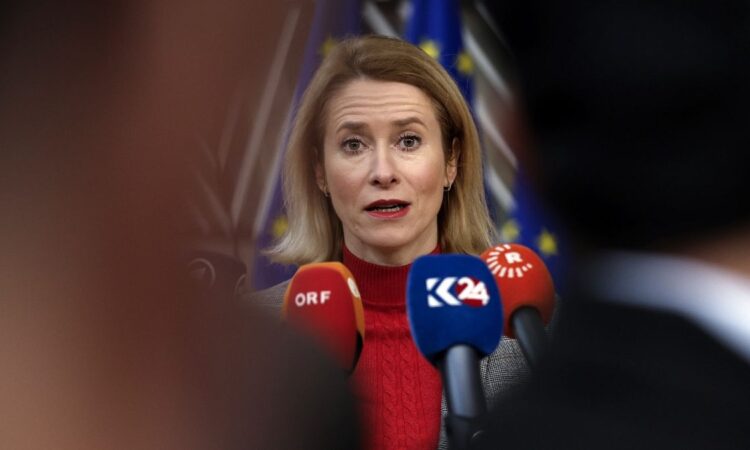
European countries must not make the same mistake Estonia did before World War II and invest heavily in defence to avoid being caught off guard, the country’s prime minister said ahead of a meeting of EU leaders.
Speaking to a select group of journalists including Euronews ahead of the two-day summit in Brussels where support to Ukraine and European defence will be top of the agenda, Kaja Kallas made the case that some European countries could be targeted by Russia should Ukraine lose the war.
“If we don’t want this war to go any further, we really have to help Ukrainians to defend themselves. It is clearly not only (the) European security architecture that is at stake, but also global security architecture.
“If we really help Ukraine, we don’t have to worry about who’s next. But, if Ukraine falls, then, there is going to be a pause of some years and we’re going to see this in a broader scale, especially when we don’t invest in defence,” she said.
She called for the countries that belong to the Ramstein coalition, which includes NATO members, the EU and 15 other states worldwide, to commit 0.25% of their Gross Domestic Product to Ukraine military aid. This, she argued, “would greatly contribute to Ukraine’s victory over Russia”.
But she also urged European countries to boost their own defence systems, drawing parallels with the Interwar period.
‘When you need it, it’s already too late’
“In 1933, the defence investment of Estonia was record low. And why? Because it was peacetime. We built up our country, and we were a neutral country. But in 1938, when it was clear that the war is (sic) coming, the defence investments were increased by 100%, but it was already too late,” she said.
“For a small country like Estonia, war always means destruction, it means human suffering,” she said.
The Baltic state, which borders Russia, was invaded by Soviet and Nazi forces during WWII and was occupied by its neighbour from 1944 until it regained independence in 1991.
The onus, Kallas added, is on leaders to properly explain the need for such an investment ramp-up to their electorate and make it clear it does not equal a pro-war stance.
“The problem with investing in defence is that, of course, for leaders who have much better neighbours than we do, it is very hard to explain to the people when it is peacetime,” she added. “But the problem with defence is that when you need it, then it’s already too late to take any further steps.”
“We want to have peace, but we want to have a sustainable peace. And the peace on Russia’s terms is not a sustainable. That means that we are going to have a pause of some years, and it’s going to go even further because they can.
“(The) Aggressor is provoked by weakness. So that’s why I’m also advocating on the European level to do more for defence, increase the defence investment because the aggressor does not take a further step if he sees that we are strong enough and he can’t win.
“He might make a different assessment if he thinks that we are weak enough and he can actually win. But we don’t want that. That’s why we need all of us, all European countries, but also NATO countries to invest in defence,” she stated.
The financing issue
The 27-country bloc is in the midst of a major revamp of its defence policy, with the European Commission putting forward proposals to boost European defence industrial capacity through joint procurements, amongst others.
The need is all the more pressing as many member states have exhausted their existing stocks to donate to Ukraine and European ammunition production, although significantly higher than a year ago, did not allow the EU to meet its target to provide the war-torn country with one million shells by March.
But how to finance the investment boost is dividing EU leaders, especially as many among the EU member states that also belong to NATO, will continue to fail this year to meet the military’s alliance target of 2% of GDP on defence expenditures.
Among the most divisive proposals is the idea to issue so-called Eurobonds to jointly raise money that would be entirely earmarked for defence spending.
Common EU debt was first issued to fund the landmark €800-billion post-pandemic recovery plan but was initially firmly opposed by so-called ‘frugal countries’ – Austria, Denmark, Finland, the Netherlands and Sweden. They feared that richer member states would end up shouldering most of the cost and that the EU would in the future turn to that financing option for other non-essential programmes.
Kallas reiterated on Wednesday her support for the issuance of eurobonds to fund defence projects, which she had previously suggested should amount to €100 billion. She also backed a proposal to revise the mandate of the European Investment Bank to allow it to finance defence projects.
She urged the EU to move forward on plans to utilise the windfall profits from immobilised Russian assets to help Ukraine defend itself and to further crack down on the Russian war machine by closing loopholes that allow sanction circumvention.






